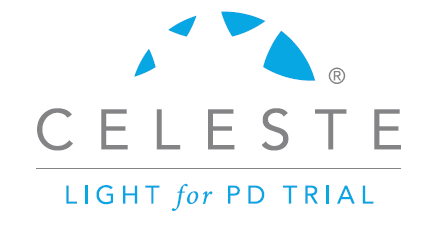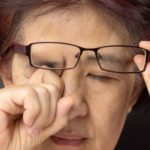
New clinical sites open in Illinois, Florida, and Arizona; trial remains open to participants across 19 states.
PhotoPharmics, the leader in specialized phototherapy for neurodegenerative diseases, announced today that it is expanding study access to states that have recently added site investigators. Some of these states, like Illinois, Florida, and Arizona, are critical because of the higher number of retirees and people with Parkinson’s.
“This added enrollment goes beyond our original goal of 300 participants,” said Kent Savage, CEO of PhotoPharmics, “We are eager to establish Celeste’s safety and efficacy in a geographically diverse population.”
Now the largest study of its kind, Light for PD is a randomized, double-blind, placebo-controlled trial evaluating the safety and effectiveness of an FDA breakthrough non-invasive light therapy designed to improve both motor and non-motor symptoms of Parkinson’s disease. The therapy builds on decades of circadian science and early-stage results that showed promising benefits in sleep, mood, motor function, and overall quality of life.
“This milestone reflects both the strength of our scientific platform and the growing urgency patients feel for new, non-drug options,” said Savage. “We’re grateful for the trust that patients and research partners have placed in us—and excited by the opportunity to expand access.”
As part of the expansion, new clinical sites have opened in Illinois, Florida, and Arizona, joining a growing national network of leading academic and community research centers. The trial is currently enrolling participants from the following states:
- Arizona (New)
- California
- Colorado
- Delaware
- Florida (new)
- Idaho
- Illinois (new)
- Massachusetts
- Michigan
- Missouri
- Montana
- New Jersey
- New York
- Ohio
- Oregon
- Pennsylvania
- Texas
- Utah
- Washington
Eligible participants will use the PhotoPharmics device daily at home, without altering their existing Parkinson’s medications. The therapy works by delivering precisely calibrated wavelengths of light to the eyes to help restore blunted circadian rhythms and improve function in impacted areas of the brain—an approach that may improve daytime alertness, sleep, mood, and other core symptoms of PD.
“We’re very optimistic,” said Dan Adams, Science Officer at PhotoPharmics. “This trial isn’t just testing a device—it’s testing a new way of thinking about Parkinson’s care: safe, non-invasive, and rooted in the body’s natural biology.”
The Light for PD trial is registered at lightforpd.com, where interested individuals can learn more and check eligibility.
About PhotoPharmics
PhotoPharmics is a privately held, clinical-stage medical device company developing next-generation therapies for treating neurodegenerative disorders through the eyes. Company founders individually have 30+ years of research and experience in this field. They previously developed specialized light solutions, now widely used to regulate circadian rhythms for seasonal affective disorder, sleep disorders, anxiety, and depression (acquired by Philips-Respironics in 2007).
Drawing from research and recent trials, PhotoPharmics is developing applications of specialized light across several neurodegenerative diseases. The company aims to make a clinically meaningful difference in patient’s lives by delivering safe and effective treatments. Learn more at www.photopharmics.com.
###
PR250801
Veteran leaders join to accelerate commercialization and market access strategy as the company advances toward regulatory submission and market launch
View full release here.
PhotoPharmics, a pioneer in specialized phototherapy for neurodegenerative diseases, today announced the formal appointment of Samantha John as Commercialization Officer and Greg Schneider as Market Access Officer. These leadership additions come at a pivotal time as the company prepares for its first commercial product launch.
 Samantha John brings over 25 years of leadership experience with multiple successful product launches in the biopharmaceutical industry and a strong record of commercial success in specialized markets. She previously held senior roles at Aimmune Therapeutics, UCB, and Eli Lilly, where she led brand strategy, patient services, global marketing, and sales teams. She also leads Horsepower Ventures, a consultancy focused on commercialization strategies across biotech and pharma. Her expertise in brand development, marketing operations, and patient engagement will be instrumental as PhotoPharmics advances its phototherapy platform.
Samantha John brings over 25 years of leadership experience with multiple successful product launches in the biopharmaceutical industry and a strong record of commercial success in specialized markets. She previously held senior roles at Aimmune Therapeutics, UCB, and Eli Lilly, where she led brand strategy, patient services, global marketing, and sales teams. She also leads Horsepower Ventures, a consultancy focused on commercialization strategies across biotech and pharma. Her expertise in brand development, marketing operations, and patient engagement will be instrumental as PhotoPharmics advances its phototherapy platform. Greg Schneider joins PhotoPharmics in a formal capacity after three years as a strategic advisor to the company. A nationally recognized expert in healthcare policy, reimbursement, and market access, he has held senior leadership roles at Medtronic, Siemens Healthineers, and Pfizer. As founder of VBHC, LLC, he has guided medtech and biotech companies through complex payer environments. His experience across coverage, coding, pricing, and patient advocacy will help ensure broad access to PhotoPharmics’ innovations.
Greg Schneider joins PhotoPharmics in a formal capacity after three years as a strategic advisor to the company. A nationally recognized expert in healthcare policy, reimbursement, and market access, he has held senior leadership roles at Medtronic, Siemens Healthineers, and Pfizer. As founder of VBHC, LLC, he has guided medtech and biotech companies through complex payer environments. His experience across coverage, coding, pricing, and patient advocacy will help ensure broad access to PhotoPharmics’ innovations.
“We’re honored to welcome Samantha and Greg to our leadership team,” said Kent Savage, CEO and co-founder of PhotoPharmics. “Their combined experience in commercialization, market access, and patient-centered strategy is exactly what we need as we enter this next stage of growth.”
Executive Leadership Team
————
- Kent Savage, CEO, Co-Founder, a serial entrepreneur and medical device executive with deep experience in light therapy innovation.
- Dan Adams, Science Officer, Co-Founder, an expert in circadian biology and inventor of specialized phototherapy systems.
- Karl Kieburtz, MD, MPH, Medical Officer, a renowned neurologist and former FDA CNS Advisory Committee chair.
- Brett Walker, Marketing Officer, a go-to-market strategist with leadership experience at Intel, Ancestry, and across health tech.
- Samantha John, Commercialization Officer, a global commercialization leader with experience at Aimmune Therapeutics, UCB, and Eli Lilly.
- Greg Schneider, Market Access Officer, a healthcare policy and reimbursement strategist with past roles at Medtronic, Siemens Healthineers, and Pfizer.
- Suzanne Hendrix, PhD, Biostatistician, a clinical trials and data science expert supporting advanced statistical planning.
- Brad Wyman, PhD, SVP, Science, an experienced research leader overseeing clinical development.
- Mike Drake, VP, Quality & Regulatory, a regulatory affairs and compliance specialist ensuring excellence in operations.
“We’ve assembled a world-class team that’s uniquely suited to the opportunity ahead,” said Kent. “From scientific leadership and regulatory depth to commercialization and access strategy, this team brings the right mix of vision, discipline, and patient focus. With Samantha and Greg now on board, we wrap up our FDA pivotal trial, and we will move with confidence toward FDA submission and market readiness.”
About PhotoPharmics
————–
PhotoPharmics is a privately held, clinical-stage medical device company developing next-generation therapies for treating neurodegenerative disorders through the eyes. Company founders individually have 30+ years of research and experience in this field. They previously developed specialized light solutions, now widely used to regulate circadian rhythms for seasonal affective disorder, sleep disorders, anxiety, and depression (acquired by Philips-Respironics in 2007).
Drawing from research and recent trials, PhotoPharmics is developing applications of specialized light across several neurodegenerative diseases. The company aims to make a clinically meaningful difference in patient’s lives by delivering safe and effective treatments. Learn more at www.photopharmics.com.
###
PR250520
Original Press Release
Funding supports key milestones as the Pivotal, Phase 3 trial surpasses 200 enrolled participants
SALT LAKE CITY – PhotoPharmics, a leader in specialized light therapy for neurodegenerative diseases, today announced the close of its oversubscribed $6 million Series B extension. The round was led by Kickstart Fund with participation from current and new investors, reflecting strong confidence in the company’s clinical promise and the commercial potential of its Parkinson’s therapy.
The new capital will support the completion of the company’s Pivotal, Phase 3 clinical trial and fund key pre-commercialization initiatives, for Celeste®, the company’s specialized light therapy device for Parkinson’s disease.
Celeste is currently being evaluated in the Light for PD clinical trial that has now surpassed 200 enrolled participants across the US.
“We’re grateful for the enthusiasm and support of our investors as we move toward the finish line of our clinical program,” said Kent Savage, CEO of PhotoPharmics. “This funding gives us the runway we need to complete our FDA research, build strategic partnerships, and ensure the best possible outcomes for patients.”
Unlike general wellness light boxes, Celeste passively delivers proprietary, disease-specific wavelengths and intensities of light to the eye to engage the brain’s natural processes, improving daytime function in people with Parkinson’s. PhotoPharmics’ earlier clinical research has shown significant and clinically meaningful improvements in both motor and non-motor symptoms—including sleep, mood, and cognition—without the systemic side effects of traditional drug therapies.
“With Celeste, we’re not just adding a new product—we’re building an entirely new category of care for Parkinson’s,” said Savage. “With over 11 million people living with Parkinson’s globally—and no breakthroughs in decades—the need for innovation is urgent. This investment helps us lay the groundwork for access, education, and advocacy around a convenient, non-invasive approach.”
PhotoPharmics anticipates completion of its Pivotal, Phase 3 trial in the coming months and is preparing its regulatory submissions.
About PhotoPharmics
PhotoPharmics is a privately held, clinical-stage medical device company developing next-generation therapies for treating neurodegenerative disorders through the eyes. Company founders individually have 30+ years of research and experience in this field. They previously developed specialized light solutions, now widely used to regulate circadian rhythms for seasonal affective disorder, sleep disorders, anxiety, and depression (acquired by Philips-Respironics in 2007).
Drawing from research and recent trials, PhotoPharmics is developing applications of specialized light across several neurodegenerative diseases. The company aims to make a clinically meaningful difference in patient’s lives by delivering safe and effective treatments. Learn more at www.photopharmics.com.
###
PR12401
Two-thirds enrolled in one of the largest remote Parkinson’s trials—redefining access and inclusion in therapeutic research
Salt Lake City, Utah – PhotoPharmics announced today that its Pivotal, Phase 3 clinical trial, Light for PD™, has now reached 200 participants—marking two-thirds of its target enrollment. This milestone positions the study as one of the largest remote therapeutic trials ever conducted in Parkinson’s care.
“This validates the deep need for new Parkinson’s treatments and patient’s and provider’s eagerness to explore innovative, non-pharmaceutical options,” said Kent Savage, CEO of PhotoPharmics.
A New Model for Parkinson’s Research
Unlike traditional drug trials, which often require frequent in-person visits and focus primarily on motor symptom management, Light for PD is a fully remote, therapeutic device study. Participants use an FDA breakthrough specialized light therapy device daily at home for six months, supported by virtual check-ins and digital assessments.
“Most Parkinson’s research focuses on motor symptoms—and almost always involves another pill,” said Dan Adams, Science Officer at PhotoPharmics. “But many people with Parkinson’s are already managing those motor symptoms. What they still live with are disruptive non-motor issues like poor sleep, depression, brain fog, and low energy. Most would welcome a solution that doesn’t require yet another prescription.”
He added, “This trial is different. We’re not replacing medications—we’re addressing a gap in care with a non-invasive, easy to use device. And by running this study remotely, we’ve expanded access and reached a broader, more real-world population that’s typically left out of traditional trials.”
Who We’re Looking For
With 200 participants already enrolled, Light for PD is now inviting additional participants—especially those often excluded from research. These include people with Parkinson’s who:
- Are on stable medication regimens
- Aren’t experiencing significant motor complications like long off times or dyskinesias
- Still face persistent symptoms and notice a diminished quality of life
“Many of these individuals feel forgotten,” said Savage. “Most pharmaceutical trials target ‘Off time’ improvements. But there’s a large segment of the Parkinson’s community that is still struggling with persistent motor and non-motor symptoms and quality of life. This trial was designed for them.”
About the Trial
Light for PD evaluates a first-of-its-kind FDA Breakthrough specialized light therapy device developed by PhotoPharmics. The light targets neural systems related to circadian rhythm and cognitive function—areas often impaired in Parkinson’s disease.
The trial is being conducted with the guidance of FDA and is expected to complete enrollment in the coming months. Participation is entirely remote and available to individuals anywhere in the continental United States.
As participants begin completing their six-month trial period, PhotoPharmics reports early optimism based on the benefits many subjects have experienced.
To learn more or see if you qualify, visit www.photopharmics.com/trial.
About PhotoPharmics
PhotoPharmics is a privately held, clinical-stage medical device company developing next-generation therapies for treating neurodegenerative disorders through the eyes. Company founders individually have 30+ years of research and experience in this field. They previously developed specialized light solutions, now widely used to regulate circadian rhythms for seasonal affective disorder, sleep disorders, anxiety, and depression (acquired by Philips-Respironics in 2007).
Drawing from research and recent trials, PhotoPharmics is developing applications of specialized light across several neurodegenerative diseases. The company aims to make a clinically meaningful difference in patient’s lives by delivering safe and effective treatments. Learn more at www.photopharmics.com.
###
PR12401
 PhotoPharmics, a pioneer in specialized phototherapy for neurodegenerative diseases, today announced the appointment of Robert A. Hauser, MD, MBA, as the new Chairman of its Clinical & Scientific Advisory Board (CSAB). Dr. Hauser assumes this leadership role following the recent passing of Warren Olanow, MD, FRCPC, a visionary in the field of Parkinson’s disease research and a long-time advocate for advancing treatments to improve patient outcomes.
PhotoPharmics, a pioneer in specialized phototherapy for neurodegenerative diseases, today announced the appointment of Robert A. Hauser, MD, MBA, as the new Chairman of its Clinical & Scientific Advisory Board (CSAB). Dr. Hauser assumes this leadership role following the recent passing of Warren Olanow, MD, FRCPC, a visionary in the field of Parkinson’s disease research and a long-time advocate for advancing treatments to improve patient outcomes.
“Dr. Warren Olanow was not only a trailblazer in neurodegenerative research but also a deeply respected leader whose guidance shaped the strategic vision of our CSAB,” said Kent Savage, CEO of PhotoPharmics. “His contributions have been invaluable, and he will be profoundly missed by the entire community.”
Dr. Hauser, an internationally recognized expert in movement disorders, has been an integral member of the CSAB and brings a wealth of experience to the chairman role. As Director of the Parkinson’s Disease and Movement Disorders Center at the University of South Florida, he has contributed extensively to clinical research, including pivotal studies that have advanced the understanding and treatment of Parkinson’s disease.
“I am honored to follow in the footsteps of Dr. Olanow,” said Dr. Hauser. “PhotoPharmics’ commitment to innovation and improving the lives of people with neurodegenerative diseases resonates deeply with my own mission, and I am eager to work with the board to continue driving meaningful advancements.”
Kent Savage reflected on the significance of this transition: “Dr. Hauser’s appointment underscores the strength and continuity of our advisory board’s leadership. His dedication to patient-centered care and his expertise in advancing scientific discovery make him uniquely qualified to guide us through this next chapter. As we honor Dr. Olanow’s legacy, we look forward to building on the foundation he helped establish, confident that Dr. Hauser will lead with similar passion and vision.”
The Clinical & Scientific Advisory Board plays a crucial role in guiding PhotoPharmics’ mission to transform neurodegenerative care. Comprised of leading experts in neurology, movement disorders, and clinical research, the CSAB provides strategic direction and scientific oversight, ensuring the company’s innovations address the unmet needs of patients and align with the highest standards of clinical and scientific excellence.
This leadership transition comes as PhotoPharmics continues to advance its Light for PD Pivotal, Phase 3 study evaluating its specialized phototherapy device designed to improve quality of life for people with Parkinson’s disease.
About PhotoPharmics
PhotoPharmics is a privately held, clinical-stage medical device company developing next-generation treatments for treating neurodegenerative disorders through the eyes. Company founders individually have 30+ years of research and experience in this field. They previously developed specialized light solutions, now widely used to regulate circadian rhythms for seasonal affective disorder, sleep disorders, anxiety, and depression (acquired by Philips-Respironics in 2007).
Drawing from research and recent trials, PhotoPharmics is developing applications of specialized light across several neurodegenerative diseases. The company aims to make a clinically meaningful difference in patient’s lives by delivering safe and effective treatments. Learn more at www.photopharmics.com.
###
PR12101


 Samantha John brings over 25 years of leadership experience with multiple successful product launches in the biopharmaceutical industry and a strong record of commercial success in specialized markets. She previously held senior roles at Aimmune Therapeutics, UCB, and Eli Lilly, where she led brand strategy, patient services, global marketing, and sales teams. She also leads Horsepower Ventures, a consultancy focused on commercialization strategies across biotech and pharma. Her expertise in brand development, marketing operations, and patient engagement will be instrumental as PhotoPharmics advances its phototherapy platform.
Samantha John brings over 25 years of leadership experience with multiple successful product launches in the biopharmaceutical industry and a strong record of commercial success in specialized markets. She previously held senior roles at Aimmune Therapeutics, UCB, and Eli Lilly, where she led brand strategy, patient services, global marketing, and sales teams. She also leads Horsepower Ventures, a consultancy focused on commercialization strategies across biotech and pharma. Her expertise in brand development, marketing operations, and patient engagement will be instrumental as PhotoPharmics advances its phototherapy platform. Greg Schneider joins PhotoPharmics in a formal capacity after three years as a strategic advisor to the company. A nationally recognized expert in healthcare policy, reimbursement, and market access, he has held senior leadership roles at Medtronic, Siemens Healthineers, and Pfizer. As founder of VBHC, LLC, he has guided medtech and biotech companies through complex payer environments. His experience across coverage, coding, pricing, and patient advocacy will help ensure broad access to PhotoPharmics’ innovations.
Greg Schneider joins PhotoPharmics in a formal capacity after three years as a strategic advisor to the company. A nationally recognized expert in healthcare policy, reimbursement, and market access, he has held senior leadership roles at Medtronic, Siemens Healthineers, and Pfizer. As founder of VBHC, LLC, he has guided medtech and biotech companies through complex payer environments. His experience across coverage, coding, pricing, and patient advocacy will help ensure broad access to PhotoPharmics’ innovations. PhotoPharmics, a pioneer in specialized phototherapy for neurodegenerative diseases, today announced the appointment of Robert A. Hauser, MD, MBA, as the new Chairman of its Clinical & Scientific Advisory Board (CSAB). Dr. Hauser assumes this leadership role following the recent passing of Warren Olanow, MD, FRCPC, a visionary in the field of Parkinson’s disease research and a long-time advocate for advancing treatments to improve patient outcomes.
PhotoPharmics, a pioneer in specialized phototherapy for neurodegenerative diseases, today announced the appointment of Robert A. Hauser, MD, MBA, as the new Chairman of its Clinical & Scientific Advisory Board (CSAB). Dr. Hauser assumes this leadership role following the recent passing of Warren Olanow, MD, FRCPC, a visionary in the field of Parkinson’s disease research and a long-time advocate for advancing treatments to improve patient outcomes.

